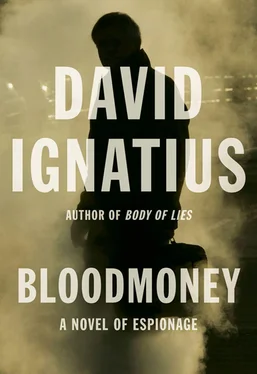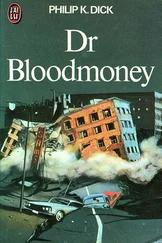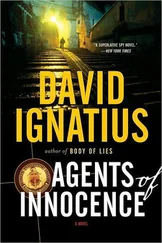David Ignatius - Bloodmoney
Здесь есть возможность читать онлайн «David Ignatius - Bloodmoney» весь текст электронной книги совершенно бесплатно (целиком полную версию без сокращений). В некоторых случаях можно слушать аудио, скачать через торрент в формате fb2 и присутствует краткое содержание. Жанр: Шпионский детектив, на английском языке. Описание произведения, (предисловие) а так же отзывы посетителей доступны на портале библиотеки ЛибКат.
- Название:Bloodmoney
- Автор:
- Жанр:
- Год:неизвестен
- ISBN:нет данных
- Рейтинг книги:4 / 5. Голосов: 1
-
Избранное:Добавить в избранное
- Отзывы:
-
Ваша оценка:
- 80
- 1
- 2
- 3
- 4
- 5
Bloodmoney: краткое содержание, описание и аннотация
Предлагаем к чтению аннотацию, описание, краткое содержание или предисловие (зависит от того, что написал сам автор книги «Bloodmoney»). Если вы не нашли необходимую информацию о книге — напишите в комментариях, мы постараемся отыскать её.
Bloodmoney — читать онлайн бесплатно полную книгу (весь текст) целиком
Ниже представлен текст книги, разбитый по страницам. Система сохранения места последней прочитанной страницы, позволяет с удобством читать онлайн бесплатно книгу «Bloodmoney», без необходимости каждый раз заново искать на чём Вы остановились. Поставьте закладку, и сможете в любой момент перейти на страницу, на которой закончили чтение.
Интервал:
Закладка:
Dr. Omar had handed the major his cell phone.
His father was still alive then, a craggy old man trying to survive in a South Waziristan that was becoming, more each day, a shooting gallery.
The major shook his head. The last thing he wanted to do was talk to an old Pashtun grandfather living among the rocks.
“What did you do at Razmak?” the major had demanded.
“I studied math and engineering. I won all the prizes there, two years before I was supposed to, so they got me a scholarship to study at the University of Peshawar, where they had a computer science department. I lived in one of the hostels and joined the Khyber Islamic Culture Society. You can check.”
“Did you know any Americans then?”
“No. I wanted to. I had a picture on my wall of Bill Gates when he was young. He looked no better or smarter than any of the Pashtun boys in the hostel. We all wanted to be like him.”
The major nodded. Bill Gates was acceptable. He asked about the Stanford trip. Who had been interested in the research?
“So many people, I did not know them all. They studied my work. They asked me questions. I told the ISI about it when I got home. A major like you, he was. You can check.”
The major did not want to make more work for himself. And it was true, the story as it had been narrated and understood was all in the files.
“Why did you go back to America?” he demanded, looking at a sheet of paper.
“I was invited to present a paper at a conference that was cosponsored by the Institute of Electrical and Electronics Engineers. It was a great honor for me, and for my university. You can ask them.”
He held out his cell phone again, so that Major Nadeem could make a call to verify, but the major shook his head.
They spent several more hours like this, going through the major episodes of Dr. Omar’s career. When they came to his most recent work on computer-security algorithms, Dr. Omar apologized that he could not talk about this work in any detail because it had been classified as “top secret” by the Pakistani military.
The major found nothing of interest. Dr. Omar was very careful, then and always. The major asked him to sign a paper, and to report any suspicious contacts, and Dr. Omar assured him that he would. The Pakistani authorities never came after him again. That was three years before his world went white.
Omar al-Wazir had multiple binary identities, it could be said. He was a Pakistani but also, in some sense, a man tied to the West. He was a Pashtun from the raw tribal area of South Waziristan, but he was also a modern man. He was a secular scientist and also a Muslim, if not quite a believer. His loyalties might indeed have been confused before the events of nearly two years ago, but not now.
Sometimes Dr. Omar grounded himself by recalling the spirit of his father, Haji Mohammed. He remembered the old man shaking his head when Omar took wobbly practice shots with an Enfield rifle, missing the target nearly every time. The look on the father’s face asked: How can this be my oldest son, this boy who cannot shoot? But Haji Mohammed had taught him the code of manhood, just the same.
Omar had learned the catechism from his father: Wars begin with badal, an assault on a man’s honor and self-respect. A proud man must avenge this insult, measure for measure, or he would suffer the greatest shame. That was why there were ceaseless wars in the tribal areas, Haji Mohammed had explained. It was the Nang-e-Pashto, the tribal code of honor, which required people to seek vengeance for the injustices inflicted by their cousins, neighbors, rival tribes, foreign invaders. A man would vow to sleep on the ground, or eat with his left hand only, until he had taken revenge, and only then would he let himself relax.
“To my mind death is better than life, when life can no longer be held with honor,” Haji Mohammed had said one night after a long talk under the stars.
“Please, Father,” Omar had implored, thinking that the old man might put a gun to his son’s head at that very moment. But Haji Mohammed had laughed and explained that he was just quoting a passage from Khushal Khan Khattak, the warrior poet of the seventeenth century, and that it was the same now and always.
This was a code that understood war, but it had been tested by the great wars that shook the red-rock hills like a long, echoing chain of explosions.
When Omar was a little boy, the Russians were still over the border and his town was a staging ground for the Afghan holy warriors. Omar remembered how they would parade through town with the guns they had received from the Americans and their Pakistani agents. When the Russians finally left, the holy warriors became ordinary warlords and it was a world of anarchy. Then when Omar was a teenager, there were the fierce young men who called themselves Talibs and demanded justice. They marched through Makeen, too, on their way in and out of Khowst and Kandahar.
But all this was just a prelude to the big war that had come after Omar had left home to pursue his studies-when Al-Qaeda came to South Waziristan with its money, and then the Americans came after them, and brought all the hell there is on earth. Dr. Omar had wondered then if he should return home, but he knew that was impossible. He had pleaded with his mother and father to leave, but that was impossible, too. They were rooted in the rocky soil like two prickly cactus bushes.
Omar had thought for a time that he could end the war if he helped make Al-Qaeda go away, so that the Americans would go away, too. But that was beyond his powers.
There was a shadow that followed him, as it follows every Pashtun man, and that was shame. It was not enough to be successful; what was essential was to be an honorable man. That was why he had gone home two years before, to see if he could escape the shadow. But another shadow, a shame that was shameless, had darkened his world.
Omar had always wondered what he would do if something bad happened to his parents. And then, on that terrible day, he had discovered the answer.
Dr. Omar waited for more of his graduate students, but none came by for the rest of the morning. He locked the door of his office and went to the computer lab, a squat two-story building a hundred yards away, where he preferred to do his communications for reasons of concealment. He had a number of different email accounts that he visited and, it might be said, a number of different personalities that inhabited these electronic spaces.
Most times, Omar felt that he was living behind a mask. But oddly, when he did this work under a variety of assumed names, he felt something close to peace.
15
Sophie Marx was numb from fatigue when she returned from Dubai. She hadn’t slept well on the outward leg because of worries about the meeting ahead. She had hoped to collapse into her seat on the way home, but she slept only fitfully: Her body was too heavy for slumber, and her mind was too hot. She had taken on responsibility, on behalf of Gertz and the whole team, for investigating the disappearance of a colleague. But she was coming home empty-handed. Her theory had been wrong. She was still baffled about how Howard Egan’s cover had been broken, and she didn’t know who else in her organization might be vulnerable. It was an oppressive sense of failing in an assignment where she had badly wanted to do well.
She tossed back and forth on the couchette of the Emirates jet, trying to get comfortable. But sleep didn’t come, and she thought about ways she could answer her questions. Part of her problem, she concluded after many hours, was that she didn’t understand the context for these events: Why was Egan in Pakistan in the first place? Why was he paying money to tribal emirs? What was the mission for which Gertz had risked this man’s life?
Читать дальшеИнтервал:
Закладка:
Похожие книги на «Bloodmoney»
Представляем Вашему вниманию похожие книги на «Bloodmoney» списком для выбора. Мы отобрали схожую по названию и смыслу литературу в надежде предоставить читателям больше вариантов отыскать новые, интересные, ещё непрочитанные произведения.
Обсуждение, отзывы о книге «Bloodmoney» и просто собственные мнения читателей. Оставьте ваши комментарии, напишите, что Вы думаете о произведении, его смысле или главных героях. Укажите что конкретно понравилось, а что нет, и почему Вы так считаете.












